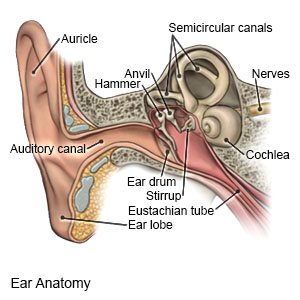Mastoidectomy
Medically reviewed by Drugs.com. Last updated on Aug 4, 2025.
What do I need to know about a mastoidectomy?
A mastoidectomy is surgery to remove part of the mastoid bone just behind your ear.
 |
How do I prepare for a mastoidectomy?
Your surgeon will talk to you about how to prepare for surgery. You may be told to not to eat or drink anything after midnight on the day of your surgery. Your surgeon will tell you what medicines to take or not take on the day of your surgery. If you have an ear infection, you may be given antibiotic medicine to take before your surgery. Before surgery, you may need blood tests, hearing tests, an x-ray, or a CT scan.
Related medications
What will happen during a mastoidectomy?
- You may be given general anesthesia to keep you asleep and free from pain during surgery. You may be given an antibiotic through your IV to help prevent a bacterial infection. Your surgeon will make an incision behind your ear in the shape of a "C". Your surgeon will use a small drill to remove part or all of your mastoid bone and air cells. The amount of bone and tissue that is removed depends on the size of the damaged area. Your surgeon will clean out the area with saline fluid.
- If your ear canal wall is removed, your surgeon may use a graft to rebuild it. The graft may be made of plastic or metal, taken from another area of your body, or taken from a donor. A graft may also be used to repair or replace your eardrum. Your surgeon will close your incision with stitches. Your surgeon may place packing inside of your ear and may also place a bandage over or around your ear. The bandage will help keep your wound clean and dry and help prevent infection.
What will happen after a mastoidectomy?
Your surgeon will check your facial movements and the feeling in your face. Sounds may echo, or you may not hear well because of blood, fluid, or bandages in your ear. It is normal for your face to feel numb on the side where the surgery is. This may last for several weeks and improve on its own. It is also normal for you to have some bloody drainage from your ear. When your surgeon says that you are okay, you may be able to go home. If you are staying in the hospital, you will be taken to your room.
What are the risks of a mastoidectomy?
You may bleed more than expected. You may have damage to nearby tissue, bone, and nerves. Facial nerve damage may lead to facial nerve paralysis. You are also at risk for damage to your brain during surgery. If your inner ear needs to be removed, you will have permanent hearing loss. After surgery, you may have a dry mouth and changes in how things taste. You may have pain, dizziness, or get an infection. An infection may spread to other areas of your body, such as your spinal cord or brain. You may get tinnitus (ringing in your ears) and you may have short-term or permanent hearing loss. Even with surgery, all of the diseased areas may not be removed. Your ear disease may return, and you may need another surgery.
Care Agreement
You have the right to help plan your care. Learn about your health condition and how it may be treated. Discuss treatment options with your healthcare providers to decide what care you want to receive. You always have the right to refuse treatment. The above information is an educational aid only. It is not intended as medical advice for individual conditions or treatments. Talk to your doctor, nurse or pharmacist before following any medical regimen to see if it is safe and effective for you.© Copyright Merative 2025 Information is for End User's use only and may not be sold, redistributed or otherwise used for commercial purposes.
Further information
Always consult your healthcare provider to ensure the information displayed on this page applies to your personal circumstances.
